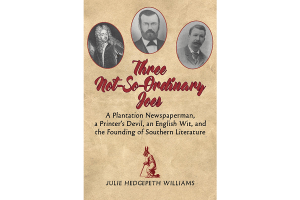Steve Donoghue in The Christian Science Monitor:
 On the surface, the new book by Julie Hedgepeth Williams, Three Not-So-Ordinary Joes, is the story of the long and winding genesis of literary culture in the post-Civil War American South. One of the “not-so-ordinary Joes” referred to in the title is, after all, Joel Chandler Harris (whose childhood nickname was Joe), author of the Uncle Remus stories that sold astoundingly well both in postwar America and around the world and influenced an entire generation of writers, playing a large role in creating a distinctive Southern literary tradition. But in addition to that surface story, there’s also a deeper narrative thread winding its way through “Three Not-So-Ordinary Joes,” a narrative about the unpredictable, often byzantine connections that thread their way from one literary generation to another. In this case, Williams quite delightfully traces this thread through the same name, linking two generations of 19th-century American Southerners with a namesake from 18th-century England, a man who never knew anything about either of them or about the American South itself.
On the surface, the new book by Julie Hedgepeth Williams, Three Not-So-Ordinary Joes, is the story of the long and winding genesis of literary culture in the post-Civil War American South. One of the “not-so-ordinary Joes” referred to in the title is, after all, Joel Chandler Harris (whose childhood nickname was Joe), author of the Uncle Remus stories that sold astoundingly well both in postwar America and around the world and influenced an entire generation of writers, playing a large role in creating a distinctive Southern literary tradition. But in addition to that surface story, there’s also a deeper narrative thread winding its way through “Three Not-So-Ordinary Joes,” a narrative about the unpredictable, often byzantine connections that thread their way from one literary generation to another. In this case, Williams quite delightfully traces this thread through the same name, linking two generations of 19th-century American Southerners with a namesake from 18th-century England, a man who never knew anything about either of them or about the American South itself.
That 18th-century figure is the most famous of the book’s trio: Joseph Addison, the essayist and playwright who in 1711 founded The Spectator magazine with his long-time friend and collaborator Richard Steele and quickly began establishing it as a high-water standard of witty and incisive English prose, a revelation of daily style and interest whose ambition was matched and ultimately exceeded by its reach in the literary world. About the ambition, Williams is as charmingly informal when dealing with this legendary figure in English letters as she is with her two other subjects. “Addison was ready to turn the tables and take over as the genius behind the new paper, which he named The Spectator,” she writes. “Dick [Steele] would still be involved, and it would take both of them – the ambition of it! – because whereas The Tatler had been published three times a week, The Spectator would come out daily.” It takes a good deal of quiet confidence in your ability as a storyteller to throw in an exclamation like that “the ambition of it!” – and that ability is in evidence on every page of the book.
More here.
